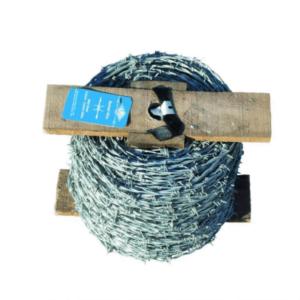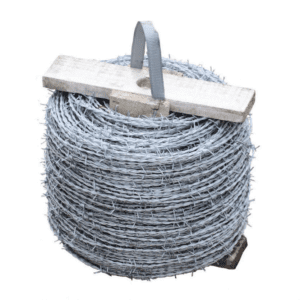
Barbed wire is a ubiquitous presence in both urban and country environments as farmers, landowners, and commercial property owners utilize it for all sorts of security and animal management purposes. So, what’s its story and how can we best use barbed wire?
What Is Barbed Wire And What Is It Used For?

Barbed wire (also known as barb wire) is a type of steel fencing wire, usually but not exclusively zinc coated by a galvanizing process. It has sharp edges or points positioned at regular intervals across the whole length of the wire.
Do you know how barbed wires were created? You use twisted wires to form a barbed wires that has two or four sharp points protruding from each ‘barb.’ Normally, you will find that barbed wires have sharp points spaced around 10-13cm apart to prevent wire manipulation.
These points effectively deter unwanted visitors, secure property or land, and keep animals in or out of a specific area. It is so successful because it prevents unwanted access at a relatively low cost.
If any intruders come in contact with the barbs, they will face discomfort and injuries. The main reason is the shape of the barbed wire that can easily break your skin or animals.
Additionally, you will find that your clothes are easily snagged on barbed wire. Furthermore, when you encounter barbed wire, it acts as a visual deterrent.
You will find that barbed wires are easy to install and cost-effective compared to more high-tech security fences. It only requires installing basic fencing equipment and tools such as fence posts, wire cutters, and fixings (such as staples) and can be constructed quickly.
Common varieties of barbed wire include high tensile barbed wire, mild steel barbed wire, and concertina barbed wire tape. Barbed wire has many lengths and thickness options according to end-use and budget.
The Brief History Of Barbed Wire:

Did you know it was an American farmer who invented a type of barbed wire in 1867? Joseph Glidden was exploring ways to prevent animals from finding their way into his garden, so he created a type of barbed wire.
However, several other people, including John Warne Gates, were responsible for popularizing the concept. Initially, American farmers were reluctant to adopt the new concept, but sales took off in 1876 once farmers could see how effectively the wire contained animals (mainly cattle).
You will often find that barbed wires are credited as the invention of the West that tamed the open range which was sectioned off because of barbed wire fencing. From barbed wire being used exclusively in farming to using them for fencing and security, its potential became apparent quickly. Therefore, since the First World War, barbed wire has remained a staple of any military conflict or battle zone.
Types Of Barbed Wire:

There are different types of barbed wire depending on your requirements. Ideally, your barbed wire will be manufactured to some sort of certified standard so that you can be sure you have a high-quality product. Here are some of the different types of barbed wire products:

High Tensile Barbed Wire:
This type of barbed wire has a significantly higher breaking strain than low tensile. You will find these types of barbed wire more flexible and resilient. So, you can use them with fencing posts that are spaces apart.
High-tensile barbed wire is available in several width options and at many lengths. If you are looking for barbed wire for permanent stand-alone fencing, opt for 2.0mm width wires. Additionally, you can use these wires with other options like high tensile stock netting.
Furthermore, you must opt for bezinal-coated premium high tensile barbed wire of 2.0mm width for durability. These wires are more expensive and premium option that lasts longer than standard galvanized wire. The flexible zinc-alloy Bezinal layer actively draws corrosion away from the core steel wire.
You will find these wires supplied on wooden reels for safe use and you can easily carry it with hessian handles. It is ideal for using for stock fencing from top to bottom or with cattle fences of three or five-strand sizes.
You will notice that these types of barbed wire are thicker than the standard wires. Thus, adding strength and durability to your barbed wire. So, naturally when you opt for these wires you can expect it to last longer. High tensile means pre-strained, so it will not stretch as much as mild steel options.

Barbed Wire Mild Steel:
If you are looking for the most cost-effective barbed wire option, opt for Barbed Wire Mild Steel. You will find that these kinds of barbed wires have a high demand among the farmers and landowners.
These mild steel barbed wires are the most popular choice but aren’t as strong as high tensile. A usual configuration will be a twin strand with four-point barbs.
Additionally, you must check that the selected barbed wire was galvanized to BSEN 10244-2 Class A. Furthermore, you must make sure that the barbed wire was manufactured to BSEN 10223-1 standard.

Concertina Barbed Wire Tape:
Many people use razor wire as a secondary line of defense. Businesses commonly use it to top their fencing and effectively deter unwanted visitors. A standard wire diameter would be 2.5mm, often seen in a visible open coil configuration.
Concertina razor wire is manufactured from galvanized steel strips, die-stamped to create razor-sharp barbs at regular intervals. Because of its particularly dangerous design, many regulations exist, including warning signs.
How Long Does Barbed Wire Last?

How long barbed wire lasts will depend on the quality and width of the steel used and its type of coating. Most barbed wire shows signs of rust after 8-20 years of use. However, when you use barbed wires that are coated with Bezinal it lasts longer.
When you use costed wires, it increases the anti-corrosion properties of the wire which helps it last longer. You get your money’s worth when using coated wires for fencing. Some premium barbed wire can outlive standard barbed wire by as much as four times.
Wrapping Up
There, you have a guide to barbed wire and its different types. If you need barbed wire, we recommend you know for what purpose you require it and select the right type based on your needs.
You can use barbed wires for different purposes like providing security against intruders and specifying property boundaries. Commercial, private, and domestic properties use barbed wires for fencing. So, you must opt for barbed wires that are cost-effective, high-quality and you can install it quickly on your property.
Read Also:




























